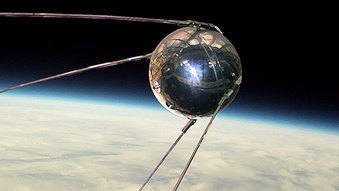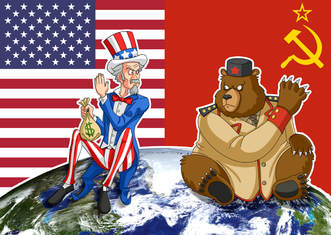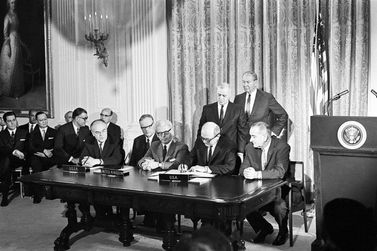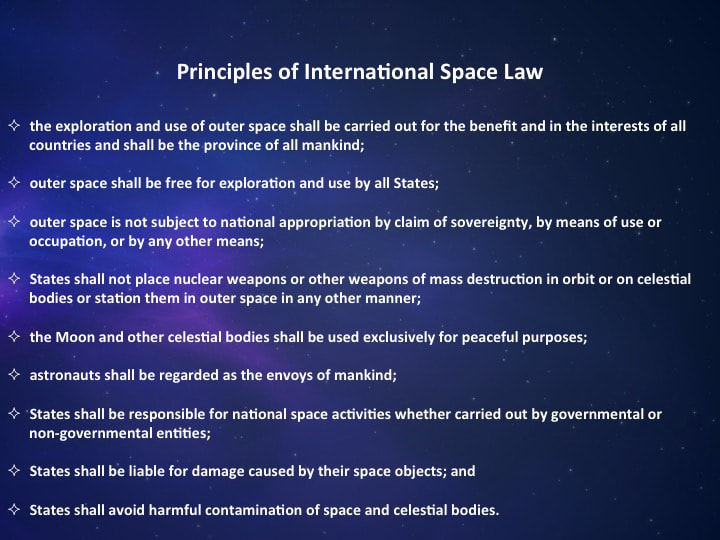|
Celebrating the 50th anniversary of the signing of the Outer Space Treaty, and considering the InnovaSpace overarching principle that advocates for a Space Without Borders, Vice-President of the Brazilian Association of Aeronautical and Space Law, José Monserrat Filho,* was invited to write a commentary on this topic.  Sputnik 1 launched 4th Oct 1957 Sputnik 1 launched 4th Oct 1957 Space Law was born out of the Cold War and lucky that it was! Were this not the case, its beginnings would have been much more complicated. What was discussed before was the warlike power of space. When Space Law was born, with the launch of Sputnik I by the former USSR, on October 4, 1957, the United States had already been developing since 1956 the Corona, the first spy satellite. Just imagine if the Corona had been the first satellite in history.  The Cold War Era The Cold War Era The Space Age would have begun under the direct impact of the Cold War - ready to boil over. Still, it was the Soviets who launched the first satellite, and the United States had to lower the ball and think of peace, to face the red danger coming from Moscow, who were now owners of the first intercontinental ballistic missile that had launched Sputnik into orbit, and could reach far enough for the USA to feel threatened. However, the USSR had been devastated by the battles throughout Europe from World War II and could not contemplate another major conflict so soon, and the United States, great winners of that War, had to overcome the pioneering space advances of the Soviets, advances that put the American population in fear. All in all, it was a big dogfight.  Signing of the Outer Space Treaty, 1957 Signing of the Outer Space Treaty, 1957 This proved to be an optimum time to create Space Law in order to prevent the transformation of space into a new battlefield. In 1958, just one year after Sputnik, the United States and the USSR agreed to the United Nations General Assembly resolution 1348 (XIII), recognizing the need to avoid taking terrestrial rivalries into space. The “peaceful uses of outer space” became the common and dominant expression. In 1958, the USA created the National Aeronautics and Space Administration (NASA), which was devoted exclusively to peaceful purposes. That same year also saw the emergence of the United Nations Committee on the Peaceful Uses of Outer Space (UNCOPUOS), which went on to approve resolutions 1471 (XIV) in 1959; 1721 (XVI) in 1961; and 1802 (XVII) in 1962, all linked to the main theme of “cooperation for peaceful uses of outer space”. Many other resolutions focused on this premise have since been approved and there is no reason to change this in the coming years. The threat of war in space grows. Today, in 2017, we celebrate the 60th anniversary of the Space Age and the 50th anniversary of the "Treaty on Principles Governing the Activities of States in the Exploration and Use of Outer Space, including the Moon and Other Celestial Bodies" - known as the "Outer Space Treaty" and considered to be the major law of space activities. The Outer Space Treaty states (Article I, § 1º): “The exploration and use of outer space, including the Moon and other celestial bodies, shall be carried out for the benefit and in the interests of all countries, irrespective of their degree of economic or scientific development, and shall be the province of all mankind.” This province is owned by all and for the common good of all.
There are some great powers, mainly those spacefaring nations, who are committed to creating a new law in order to favour their military forces and businesses. Fortunately, most of the UN General Assembly member states support the Outer Space Treaty and have no desire to change the fundamental principles that underpin it. What will Space Law be like in this new and rather more tense 'Cold War' of the 21st century? It will be essential for nations to battle intensively towards the objective of achieving a more humanistic International Law. Curiously enough, today more than ever, the benefits and services provided by space are indispensable to the whole world. Yet, also more than ever, space has become threatened, especially due to armed conflicts and the growing hazards presented by the ever-increasing mass of space debris orbiting around our planet. *José Monserrat Filho, Vice-President of the Brazilian Association of Aeronautical and Space Law (SBDA), former Head of the International Cooperation Office of the Ministry of Science and Technology (2007-2011) and the Brazilian Space Agency (AEB) (2011-2015), Honorary Director of the International Institute of Space Law, and Full Member of the International Academy of Astronautics. Ex-Director of the magazine Ciência Hoje and Editor of the Jornal da Ciência, SBPC, author of Politics and Law in the Space Age - Can we be fairer in Space than on Earth? (Vieira & Lent Casa Editorial, 2017). E-mail: [email protected]
1 Comment
Naile Russomano
12/11/2017 08:33:25 pm
Importante artigo sobre direito espacial. Parabéns e aplausos !!
Reply
Your comment will be posted after it is approved.
Leave a Reply. |
Welcometo the InnovaSpace Knowledge Station Categories
All
|
InnovaSpace Ltd - Registered in England & Wales - No. 11323249
UK Office: 88 Tideslea Path, London, SE280LZ
Privacy Policy I Terms & Conditions
© 2024 InnovaSpace, All Rights Reserved
UK Office: 88 Tideslea Path, London, SE280LZ
Privacy Policy I Terms & Conditions
© 2024 InnovaSpace, All Rights Reserved

 RSS Feed
RSS Feed